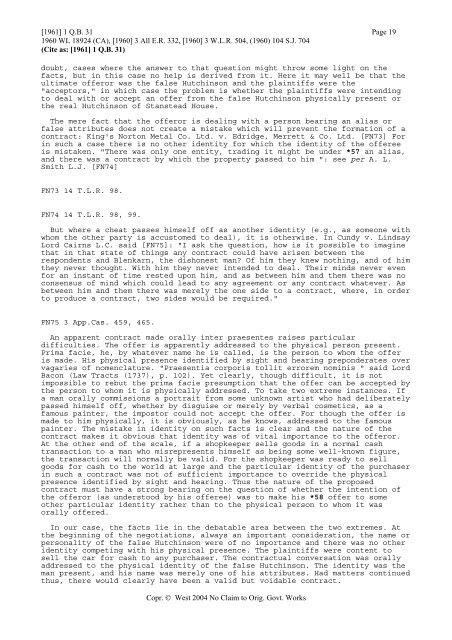Tesco v Constain - Thomson Reuters
Tesco v Constain - Thomson Reuters
Tesco v Constain - Thomson Reuters
You also want an ePaper? Increase the reach of your titles
YUMPU automatically turns print PDFs into web optimized ePapers that Google loves.
[1961] 1 Q.B. 31 Page 191960 WL 18924 (CA), [1960] 3 All E.R. 332, [1960] 3 W.L.R. 504, (1960) 104 S.J. 704(Cite as: [1961] 1 Q.B. 31)doubt, cases where the answer to that question might throw some light on thefacts, but in this case no help is derived from it. Here it may well be that theultimate offeror was the false Hutchinson and the plaintiffs were the"acceptors," in which case the problem is whether the plaintiffs were intendingto deal with or accept an offer from the false Hutchinson physically present orthe real Hutchinson of Stanstead House.The mere fact that the offeror is dealing with a person bearing an alias orfalse attributes does not create a mistake which will prevent the formation of acontract: King's Norton Metal Co. Ltd. v. Edridge, Merrett & Co. Ltd. [FN73] Forin such a case there is no other identity for which the identity of the offereeis mistaken. "There was only one entity, trading it might be under *57 an alias,and there was a contract by which the property passed to him ": see per A. L.Smith L.J. [FN74]FN73 14 T.L.R. 98.FN74 14 T.L.R. 98, 99.But where a cheat passes himself off as another identity (e.g., as someone withwhom the other party is accustomed to deal), it is otherwise. In Cundy v. LindsayLord Cairns L.C. said [FN75]: "I ask the question, how is it possible to imaginethat in that state of things any contract could have arisen between therespondents and Blenkarn, the dishonest man? Of him they knew nothing, and of himthey never thought. With him they never intended to deal. Their minds never evenfor an instant of time rested upon him, and as between him and them there was noconsensus of mind which could lead to any agreement or any contract whatever. Asbetween him and them there was merely the one side to a contract, where, in orderto produce a contract, two sides would be required."FN75 3 App.Cas. 459, 465.An apparent contract made orally inter praesentes raises particulardifficulties. The offer is apparently addressed to the physical person present.Prima facie, he, by whatever name he is called, is the person to whom the offeris made. His physical presence identified by sight and hearing preponderates overvagaries of nomenclature. "Praesentia corporis tollit errorem nominis " said LordBacon (Law Tracts (1737), p. 102). Yet clearly, though difficult, it is notimpossible to rebut the prima facie presumption that the offer can be accepted bythe person to whom it is physically addressed. To take two extreme instances. Ifa man orally commissions a portrait from some unknown artist who had deliberatelypassed himself off, whether by disguise or merely by verbal cosmetics, as afamous painter, the impostor could not accept the offer. For though the offer ismade to him physically, it is obviously, as he knows, addressed to the famouspainter. The mistake in identity on such facts is clear and the nature of thecontract makes it obvious that identity was of vital importance to the offeror.At the other end of the scale, if a shopkeeper sells goods in a normal cashtransaction to a man who misrepresents himself as being some well-known figure,the transaction will normally be valid. For the shopkeeper was ready to sellgoods for cash to the world at large and the particular identity of the purchaserin such a contract was not of sufficient importance to override the physicalpresence identified by sight and hearing. Thus the nature of the proposedcontract must have a strong bearing on the question of whether the intention ofthe offeror (as understood by his offeree) was to make his *58 offer to someother particular identity rather than to the physical person to whom it wasorally offered.In our case, the facts lie in the debatable area between the two extremes. Atthe beginning of the negotiations, always an important consideration, the name orpersonality of the false Hutchinson were of no importance and there was no otheridentity competing with his physical presence. The plaintiffs were content tosell the car for cash to any purchaser. The contractual conversation was orallyaddressed to the physical identity of the false Hutchinson. The identity was theman present, and his name was merely one of his attributes. Had matters continuedthus, there would clearly have been a valid but voidable contract.Copr. © West 2004 No Claim to Orig. Govt. Works
















